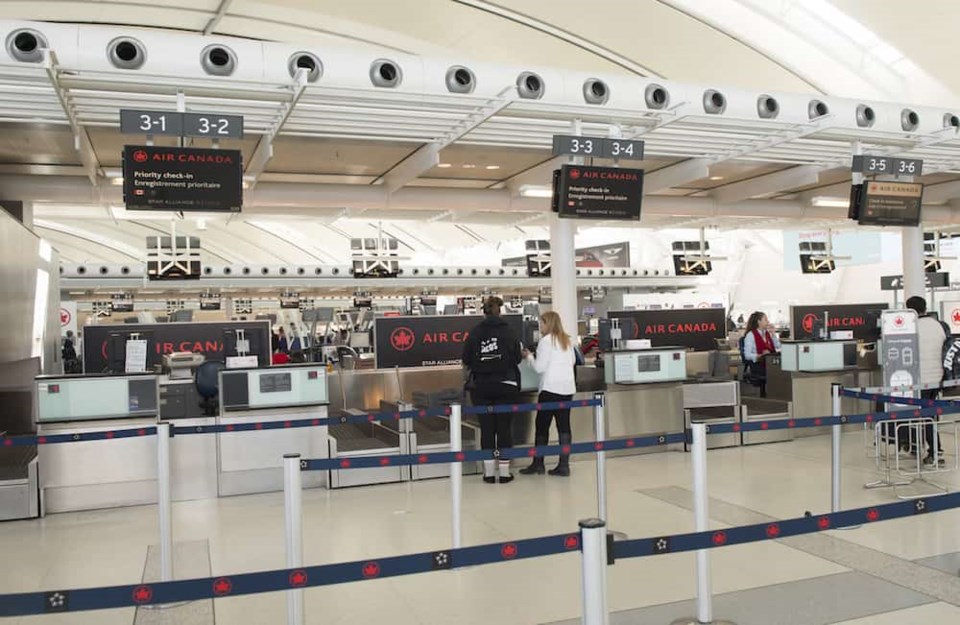While many Canadians wouldn't choose to fly outside of the country right now, others feel that it is safe to do so. However, a number of these prospective international travellers are deterred by Canada's mandatory 14-day quarantine.
Now, Air Canada says it hopes that a new program could help protect customers and facilitate the safe relaxation of government travel restrictions.
Canada's largest airline took to Twitter this week to explain how a test-based strategy may be a safe alternative to the 14-day quarantine.
"We’ve sponsored a McMaster HealthLabs study with over 15,000 voluntary COVID-19 tests taken by international customers arriving at Toronto Pearson Airport," read the .
"Over 99% have tested negative."
Last week, Air Canada stated in a news release that it was finalizing an initial order of Abbott's ID NOW COVID-19 rapid response tests as part of its ongoing evaluation of COVID-19 testing technology and protocols.
The airline, which last month partnered with McMaster Health Labs (MHL) and the Greater Toronto Airports Authority (GTAA) in a study of arriving international travellers at Toronto-Pearson, said preliminary results from the study indicate testing can help protect customers and facilitate the safe relaxation of government travel restrictions.
"Air Canada continues to explore various options for testing for COVID-19 and we are finalizing an initial order from Abbott for 25,000 rapid test kits for voluntary employee testing now that it has been approved for use in Canada. Understanding that we will need to live alongside this virus for the short- to medium-term, we have been pursuing relationships and a layered approach as a way to keep our employees and our customers safe. We believe testing will be key to protecting employees and customers until such time as a COVID-19 vaccine is available. Rapid testing is also a means to enable governments to relax current blanket travel restrictions and quarantines in a measured way while still safeguarding the health and safety of the public," said Dr. Jim Chung, Air Canada's Chief Medical Officer.
"We are further encouraged in our belief in the effectiveness of testing, including self-administered testing, by the preliminary results from our partnership with MHL and the GTAA. The preliminary results suggest a shorter, test-based strategy may be an available and safe alternative to the 14-day quarantine."
Since the Toronto-Pearson study began Sept. 3, MHL has conducted nearly 13,000 tests of returning international travellers who volunteered to participate. Of those, more than 99% have tested negative for COVID-19 with less than 1% having indicated COVID-19. Of the less than 1% indicating COVID-19, more than 80% are being detected in the initial test and the rest on the Day 7 test, with none being detected by the Day 14 test.
Under the study, consenting participants provided a sample to MHL researchers before leaving the airport and supplied two additional samples that were self-collected seven and fourteen days after arrival, coinciding with the federal government's quarantine period.
Participants were notified electronically of the first results within 48 hours. Data collected will remain confidential and will be anonymously aggregated for the study.
International Travel Today
While sipping on a refreshing cocktail in the tropics might sound enticing, the Canadian government advises you to think twice before booking a ticket to paradise. Due to the COVID-19 pandemic, governments that have opened their borders to tourists could impose strict travel restrictions suddenly, which could make it difficult for you to return home.
That said, a recent update to a travel advisory may make it just a little bit easier to visit the Aloha state on your next holiday.
On Sept. 16, Hawaiian Governor David Ige declared that the state’s pre-travel testing program will launch on Oct. 15, which will allow trans-Pacific travellers to visit the island state without quarantining upon arrival. They need to get the test before their arrival and show proof of a negative test no more than 72 hours in advance of travel.
While Canadians are not forbidden from travelling to the United States, the Government strongly urges them to avoid non-essential travel outside the country until further notice.
Under a measure from the Government of British Columbia, all arriving passengers from outside Canada, regardless of their final destination, are required to submit a self-isolation plan. Learn more about the Province's self-isolation plan requirement . The plan can be submitted online or at the Self-Assessment Tool, through the BC COVID-19 Support App, or in-person on arrival at YVR. It must show that returning passengers have supports in place to safely self-isolate for 14 days.



